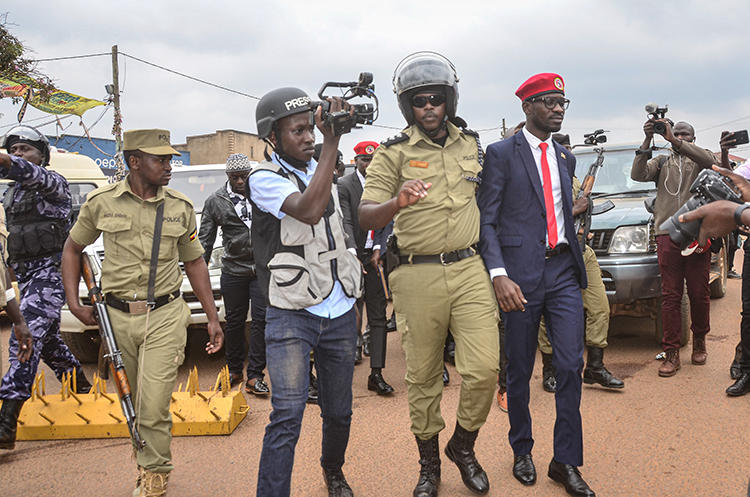Nairobi, January 14, 2020 — Ugandan police should drop all charges against journalist Willy Tamale and cease harassing reporters for their political coverage, the Committee to Protect Journalists said today.
On January 6, police in central Uganda’s Wakiso district detained four journalists who were covering a planned political event by opposition politician Robert Kyagulanyi, popularly known as Bobi Wine, according to news reports and Facebook posts by Robert Ssempala, the executive director of the Human Rights Network for Journalists-Uganda, a local press rights group.
Police released three of the journalists later that day without charge, but detained Tamale, a reporter with the Luganda-language television station BBS Terefayina and a contributor to the Tamie Imagez YouTube page, until the following evening at the nearby Kasangati police station, according to Tamale and Ssempala, both of whom spoke to CPJ via messaging app.
BBS Terefayina is associated with the Kingdom of Buganda, a sub-national kingdom in central Uganda, according to the kingdom’s website, and Tamie Imagez is a privately owned outlet that publishes content supportive of Bobi Wine, according to CPJ’s review of its programming.
Ssempala told CPJ that police initially claimed that they were holding Tamale on charges of incitement. On January 7, authorities charged Tamale with disturbance and obstruction, and released him on police bond pending investigation, though they did not cite a specific law that he’s alleged to have broken, according to Tamale and a police document reviewed by CPJ.
Police requested Tamale check in at the Kasangati station on January 13; when he did, they asked that he return on January 20, Tamale and Ssempala said.
On January 8, government security personnel in Lira, in northern Uganda, barred journalists from covering another of Bobi Wine’s planned public meetings and forcibly deleted pictures taken by two reporters, Denis Okello of Voice of Lango FM and Bismark Olang of Unity FM, according to the journalists, who spoke to CPJ via messaging app.
“Arresting and harassing journalists who cover opposition events robs the Ugandan public of its right to stay informed about democratic processes in the country,” said CPJ’s sub-Saharan Africa representative, Muthoki Mumo. “Police should immediately drop any charges against Willy Tamale, and security personnel should provide public guarantees that journalists covering opposition politicians can do so safely.”
The January 6 and 8 events were part of a planned series of public consultations that Bobi Wine announced as part of his run for president in Uganda’s 2021 elections, according to news reports. Police have repeatedly disrupted and stopped the meetings from taking place, according to those reports.
The other journalists arrested alongside Tamale on January 6 included Ssematimba Bwejire, a senior reporter with the privately owned Radio Simba, and Edward Kisekka, a video journalist with the privately owned broadcaster NBS TV, both of whom were detained for about an hour and then released without charge, the journalists told CPJ via messaging app.
Officers in plainclothes questioned Kisekka about why he had been filming them and forced him to delete footage that he had recorded, Kisekka told CPJ via messaging app. He said that one of the officers claimed that journalists were “paid to fuel instability.” Because the officers were not wearing uniforms, he said he did not know what agency or police department they were from.
Police in Wakiso also arrested and briefly detained Arnold Sseremba, a reporter with NTV Uganda, according to a Facebook post by the station and a report by its sister publication, the Daily Monitor newspaper.
At the Bobi Wine event at the Pacific Grand Hotel in Lira on January 8, military officers approached Okello and Olang, asked why they were taking pictures, and confiscated their phones and Olang’s motorbike, the journalists told CPJ. Later that day, when Okello and Olang went to retrieve their gear, officers forced them to unlock their phones and deleted photos they had taken of the venue, the journalists said.
In a separate incident on January 8, police officers at a checkpoint outside Lira stopped a group of reporters from several media houses who had travelled from the capital, Kampala, to cover Bobi Wine’s events, and told them to report to the nearest police station, according to a report by the Daily Monitor. The journalists abandoned their van and travelled by motorbike taxi to cover the event, according to Olang and Okello, who met the journalists at the event.
Peter Nkulega, the regional police commander with jurisdiction over Lira, referred CPJ to Uganda national police spokesperson Fred Enanga for comment. Enanga did not answer phone calls or respond to text messages sent by CPJ asking for comment on the incidents in both Lira and Wakiso.
Military spokesperson Richard Karemire, who spoke to CPJ in a phone interview, said that no reports had been filed to the army about any incidents involving journalists in Lira. He said any reports would be investigated if they were filed.
In May 2019, Uganda’s broadcasting regulator ordered 13 local stations to suspend staffers in connection with their coverage of Bobi Wine, and in September 2018 police arrested at least eight journalists covering the politician, according to CPJ reporting from the time.
